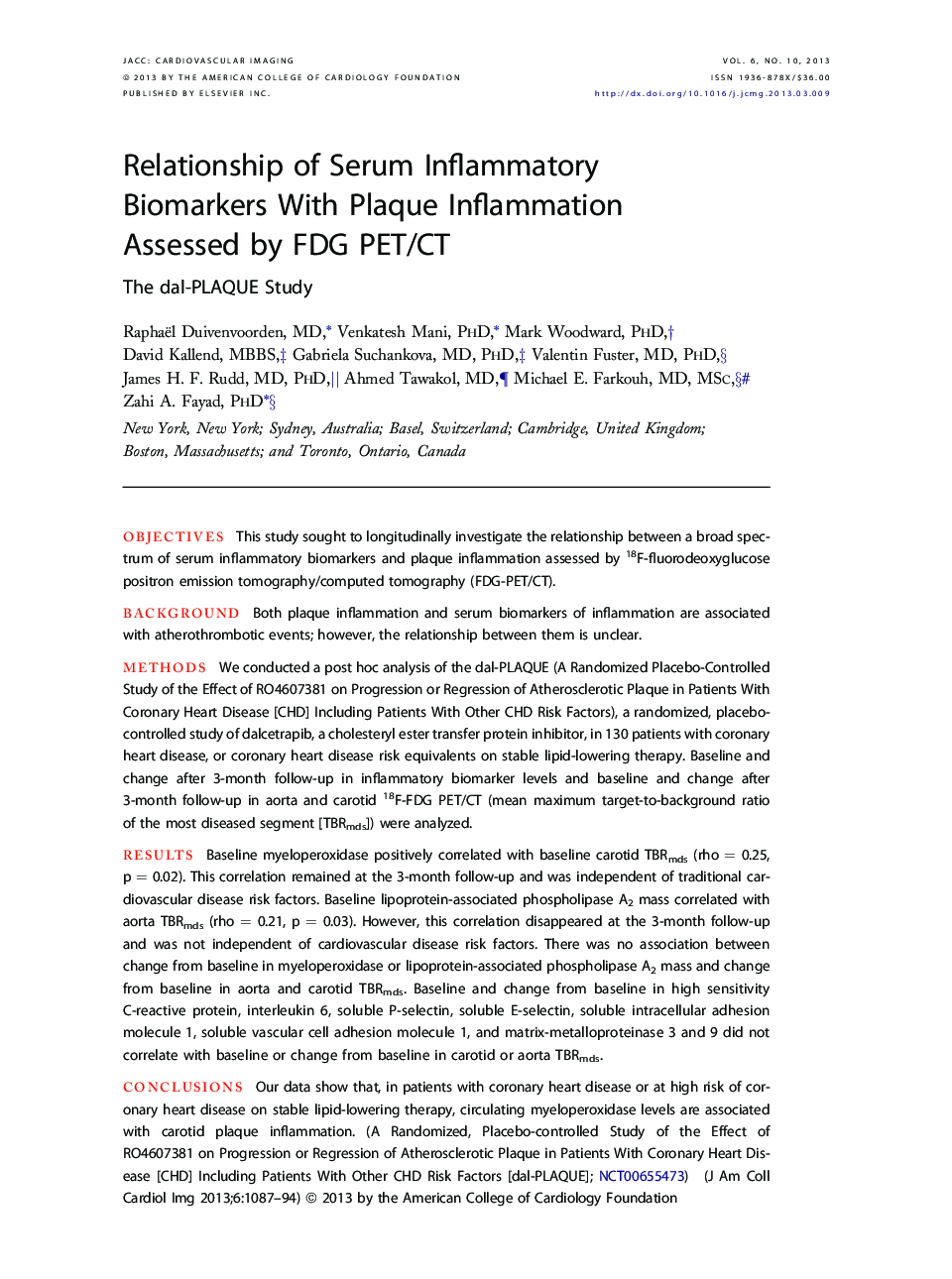| کد مقاله | کد نشریه | سال انتشار | مقاله انگلیسی | نسخه تمام متن |
|---|---|---|---|---|
| 5980406 | 1176922 | 2013 | 8 صفحه PDF | دانلود رایگان |

ObjectivesThis study sought to longitudinally investigate the relationship between a broad spectrum of serum inflammatory biomarkers and plaque inflammation assessed by 18F-fluorodeoxyglucose positron emission tomography/computed tomography (FDG-PET/CT).BackgroundBoth plaque inflammation and serum biomarkers of inflammation are associated with atherothrombotic events; however, the relationship between them is unclear.MethodsWe conducted a post hoc analysis of the dal-PLAQUE (A Randomized Placebo-Controlled Study of the Effect of RO4607381 on Progression or Regression of Atherosclerotic Plaque in Patients With Coronary Heart Disease [CHD] Including Patients With Other CHD Risk Factors), a randomized, placebo-controlled study of dalcetrapib, a cholesteryl ester transfer protein inhibitor, in 130 patients with coronary heart disease, or coronary heart disease risk equivalents on stable lipid-lowering therapy. Baseline and change after 3-month follow-up in inflammatory biomarker levels and baseline and change after 3-month follow-up in aorta and carotid 18F-FDG PET/CT (mean maximum target-to-background ratio of the most diseased segment [TBRmds]) were analyzed.ResultsBaseline myeloperoxidase positively correlated with baseline carotid TBRmds (rho = 0.25, p = 0.02). This correlation remained at the 3-month follow-up and was independent of traditional cardiovascular disease risk factors. Baseline lipoprotein-associated phospholipase A2 mass correlated with aorta TBRmds (rho = 0.21, p = 0.03). However, this correlation disappeared at the 3-month follow-up and was not independent of cardiovascular disease risk factors. There was no association between change from baseline in myeloperoxidase or lipoprotein-associated phospholipase A2 mass and change from baseline in aorta and carotid TBRmds. Baseline and change from baseline in high sensitivity C-reactive protein, interleukin 6, soluble P-selectin, soluble E-selectin, soluble intracellular adhesion molecule 1, soluble vascular cell adhesion molecule 1, and matrix-metalloproteinase 3 and 9 did not correlate with baseline or change from baseline in carotid or aorta TBRmds.ConclusionsOur data show that, in patients with coronary heart disease or at high risk of coronary heart disease on stable lipid-lowering therapy, circulating myeloperoxidase levels are associated with carotid plaque inflammation. (A Randomized, Placebo-controlled Study of the Effect of RO4607381 on Progression or Regression of Atherosclerotic Plaque in Patients With Coronary Heart Disease [CHD] Including Patients With Other CHD Risk Factors [dal-PLAQUE]; NCT00655473)
Journal: JACC: Cardiovascular Imaging - Volume 6, Issue 10, October 2013, Pages 1087-1094